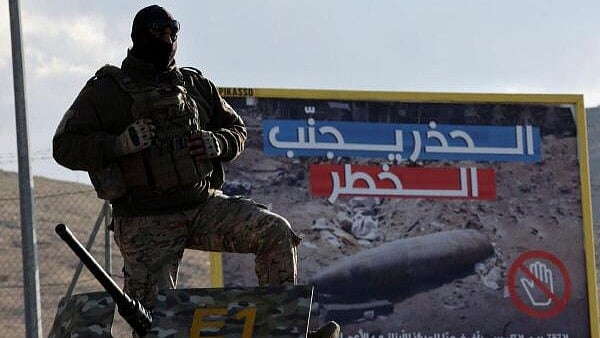
A member of the Lebanese army stands on top of a military vehicle at Masnaa Border Crossing, after Syrian rebels announced that they have ousted President Bashar al-Assad, Lebanon, December 8, 2024.
Reuters
President Bashar Assad has resigned and left Syria, Russia's foreign ministry said Sunday, a stunning fall for the longtime dictator after rebels opposed to his rule stormed across the country and seized control of the capital in less than two weeks.
The foreign ministry's statement did not offer details on Assad's exact whereabouts, saying only that he had held talks with "several parties of the armed conflict."
There was no immediate comment from the Syrian presidency about Assad.
Assad's departure was an earthshaking moment in the history of Syria, which has been ruled by his family with an iron fist since the early 1970s. It marked a dramatic breakthrough for rebel factions in Syria that have been trying to unseat Assad for more than a decade, much of which was marked by a devastating civil war.
For many in Syria, Assad's fall was a moment filled with hope as they no longer feared the regime that has used oppressive tactics to quash their freedoms. But it was also rife with uncertainty over who will rule Syria next and raised fears of a power vacuum in a country that has been riven with competing factions vying for control of different areas of territory.
"Our hearts are dancing with joy," Walaa Salameh, 35, a resident of the Damascus area, said in a phone interview. "We can't predict the future, and anything is possible, but the most important thing is we got rid of this oppressive regime."
Earlier Sunday, the main rebel coalition, Hayat Tahrir al-Sham, had announced on its Telegram channel that it had taken the capital, Damascus, and that Syrian forces were withdrawing. It later said that Assad had fallen and that Damascus was "free of the tyrant."
The events capped a startling two weeks in which the coalition of rebel groups that had been pinned down in a small corner of Syria's northwest swept through the country's major cities, shattering a stalemate in Syria's 13-year civil war.
As reports spread of Syrian government troops fleeing their posts and peeling off uniforms, the sounds of gunfire erupted in Damascus before dawn Sunday, witnesses said. By late morning, the streets were largely empty, but the sound of gunfire still echoed.
"No one should shed any tears over the end of the Assad regime," Daniel B. Shapiro, the U.S. deputy assistant secretary of defense for the Middle East, said in Bahrain before Russia's foreign ministry issued the statement.
Amid swirling questions over Assad's whereabouts, Syria's prime minister, Mohammad Ghazi al-Jalali, said that he had not spoken with him since Saturday. Ghazi said that he would stay in the country and was ready to work with whomever Syrians choose as their leader.
Hayat Tahrir al-Sham said it would work with Ghazi and called on Syrian military forces in Damascus to stay away from public institutions, which it said would remain under Ghazi's supervision until they are formally handed over.
-- Who are the rebels?: The head of the Islamist group leading the main rebel coalition said in an interview with The New York Times last week that the fighters aim to depose Assad. First, the rebels seized Syria's largest city, Aleppo, then days later blazed through Hama and the strategic city of Homs, en route to the capital. His group, Hayat Tahrir al-Sham, broke ties with al-Qaida in 2016 but is still designated a terrorist organization by the United States.
-- Damascus reacts: Three civilians in the capital told the Times that they heard gunfire in the city overnight. It was not immediately clear at the time who was firing. One resident said the gunfire appeared to be celebrating the rebels' advance and that some people were dancing in the streets. Amid the celebration, Syrians were also mourning all they had lost over 13 years of civil war.
-- Assad's allies: Assad had kept rebel forces at bay for more than a decade with Iranian and Russian military support. But in recent days, Iran and Russia appeared to be turning to diplomacy to preserve their interests in the country rather than significant military support.
-- Prisoners freed: As the rebels advanced, they took over many of the notorious prisons where the Assad regime has for decades imprisoned, tortured and executed political prisoners. Videos emerging from north of Damascus show groups of men walking through city streets at night, reportedly after being freed from Sednaya Prison, which the rebels have taken, according to war monitors and the fighters.
-- Refugees look homeward: Some Syrian refugees around the world have been glued to the news for updates on whether the Assad regime had fallen. Muhammad al-Shammary, who fled the Damascus suburbs for Turkey in 2013, said he hoped to return to the country as soon as it was safe and feasible to do so. He hasn't seen most of his family members -- including his siblings and in-laws -- for over a decade. Many Syrian refugees had resigned themselves to a life in exile, said Shammary, 44. "They engraved this inside our minds: that they would rule forever," he said.
-- Broader instability: Israel's military said it had entered a demilitarized buffer zone in territory it controls in the Golan Heights, abutting Syria. The Israeli military, which is concerned about the sudden surge in instability near its borders, said it was acting to protect Israeli civilians. Iraq has secured its border with Syria, according to the official Iraqi News Agency, which said Sunday that the al-Qaim border crossing was closed.